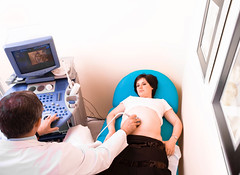Displaying items by tag: abortionvulnerable
Option Line, StandUpGirl, and the Midnight Chat

A high school senior just weeks away from graduation, Jana was on top of the world. She had just been accepted into her dream college and had one more carefree summer before packing up and leaving for her new adventure.
Everything was on track. That is, until Jana began to suspect that maybe, just maybe, her path had suddenly changed directions.
Jana’s friend bought her a pregnancy test, and the pair took it to her friend's house, so that Jana’s parents wouldn't suspect anything was up. The strategy had a short shelf life, however, as the pregnancy test showed positive… she was pregnant.
Even though she felt pressured to abort her baby, Jana was terrified that some day she would regret it.
Jana cried all afternoon and well into the night. Finally, in desperation, she typed in"abortion stories" to her search engine, hoping to find stories of post-abortion women who had gone on to live happy, fulfilled lives.
What she found was StandUpGirl.com. Jana read story after story about young women just like her who had submitted to an abortion and later shared their experience on the online forum. Story after story was shared as encouragement to not make the same mistake as the writer.
Moved by what she read, Jana clicked a box on the sidebar, opening up a live chat program.
The chat link connected Jana to an Option Line® consultant, who answered her immediately. Jana poured out her heart, sharing her fears, and what she'd read on StandUpGirl. She shared that, while she wanted to protect and care for her baby, she felt it would be selfish to bring a child into the world without a good job, house, or stability.
On the other end of the live chat, the Option Line consultant helped Jana understand that giving her child life was the most unselfish thing she could do. She explained to Jana that, in addition to single parenting or married parenting, Jana could also choose to parent through adoption, entrusting her child into the hands of an adoptive family.
She also let Jana know that help was available to her. A pregnancy center would be able to work with her for everything from diapers and wipes to maternity clothes and community referrals for help with food and medical care.
As the early morning conversation came to a close, Jana agreed to visit a center in her area, and told the Option Line consultant she finally felt ready to sleep, knowing that a brighter day lay ahead.
While Heartbeat’s Option Line® gains most of its traffic from its own advertising and web presence, the 24-7 pregnancy helpline also partners with several national organizations like StandUpGirl.com and TeenBreaks.com to reach over 1,000 contacts per month—just like Jana—via live chat and text.
A "Precious" day to remember
 |
Thirteen years ago, a woman came into the office seeking abortion. She was in deep pain. Hurt and at the crossroads. Her husband had abandoned her for another woman, leaving her with a pregnancy and four other children to take care of.
Now, with a fifth child in the womb, she saw only reasons to terminate her pregnancy. Besides that, she had no funds for rent or to send her kids to school. She was afraid to go through all these issues alone, without a husband. There seemed no way for her to survive, especially with one more mouth to feed.
Her mind was just abortion.
The woman was counseled, but still she left being abortion minded.
September 21, 2012, the woman called my number and asked if Silent Voices still existed. I told her we are still there and our offices are now at 33 Nsombo Street. She then said, “I would like to come to the office, and I am coming with my 12-year-old daughter who was saved in that same Center.”
She also said, “For many years, I have been talking to my daughter about that place, and I promised her that one day I would take her to meet her spiritual mom.”
Seven days later, the woman came in with a special gift—her daughter that was saved 13 years ago. Her daughter is named “Precious.” We all broke into tears of joy, danced and sang songs of joy.
 |
Precious is in seventh grade now and she is about to write her seventh-grade exams. She is very good at speaking English and she is a leader at the church youth group. She told us she likes reading and going to church.
Precious’ mother is still single and very much committed to taking care of her children. Thank you so much, faithful friends and partners, for standing with us in many ways. Because of you, today we are able to witness God's faithfulness through the LIFE He brought to the Center today.
Your prayers and support are highly valued, be blessed always and rejoice with us always.
Continue to pray for both Precious and her mother as they work hard to pull through in life. Precious has five years to go before she finishes 12th grade and goes into college. Kindly pray with her.
This letter was originally sent to friends and donors by Barbara Mwanza, Executive Director of Silent Voices Zambia, one of over 300 non-U.S. Heartbeat International affiliates. It has been adapted for use at HeartbeatServices.org.
Pro-Life Prenatal Diagnostics
 Prenatal diagnosis is now much easier and safer than ever before. But, these advances also exist within a mix of conflicting and sometimes hidden agendas. January is Birth Defects Prevention Month, so there's no better time to examine the topic and focus on the critical role PHC/PMC’s play in preventing birth defects.
Prenatal diagnosis is now much easier and safer than ever before. But, these advances also exist within a mix of conflicting and sometimes hidden agendas. January is Birth Defects Prevention Month, so there's no better time to examine the topic and focus on the critical role PHC/PMC’s play in preventing birth defects.
The education we provide to our clients may be the determining factor in preventing a child from being born with birth defects, but this fact raises a great dichotomy to the surface: On one hand, we desire all mothers and babies to be healthy, and we should proactively educate them on how to achieve this. On the other hand, however, we must carefully construct our instruction in a way that avoids negatively influencing a client to seek an abortion if she should learn of a negative diagnosis regarding her baby.
Fetal problems are a serious rationale for considering abortion in our current culture, spurred in part by diagnosis of these abnormalities with the increased use of ultrasound, amniocentesis, and other tests in pregnancy. Ultrasound studies to determine fetal anatomy are often done at 18-20 weeks, so abortions done as a result of these scans are late abortions. But ultrasound is imperfect and analysis of the images can result in inaccurate interpretations.
Pregnant women who have declined abortion for fetuses diagnosed by ultrasound with fatal birth defects have sometimes ended up giving birth to normal babies. Other parents have resisted recommended abortions for serious anatomical problems, and had their babies undergo surgical repair after birth.
A great example of this truth comes from, Is Late-Term Abortion Ever Necessary?, an article by Mary Davenport, M.D., published on the American Association of Pro-life Obstetricians and Gynecologists website:
C. Everett Koop, M.D., the former surgeon general and renowned pediatric surgeon, was asked during the partial-birth abortion hearings if he had treated children “born with organs outside of their bodies” (omphalocele). Dr. Koop replied, “Oh, yes indeed. I’ve done that many times. The prognosis usually is good….the first child I ever did, with a huge omphalocele much bigger than her head, went on to develop well and become the head nurse in my intensive care unit many years later.”
For fatal birth defects, abortion is sometimes presented as the only option. But a better alternative is perinatal hospice. This involves continuing the pregnancy until labor begins and giving birth normally, in a setting of comfort and support until natural death occurs. It is similar to what is done for families with terminally ill children and adults. Karen Santorum, a nurse and the wife of former Senator Rick Santorum, was faced with the prospect of her own son, Gabriel, being born with a fatal birth defect. She describes how Gabriel lived only two hours, but how in those two hours “we experienced a lifetime of emotions. Love, sorrow, regret, joy—-all were packed into that brief span. To have rejected that experience would have been to reject life itself.” The sense of peace and closure felt by families experiencing neonatal death in a hospice setting contrasts markedly with the experience of families undergoing abortion for fetal anomalies. Couples who have had abortions for birth defects may suffer from adverse long-term psychological effects and prolonged grief reactions. Children who learn that their mothers aborted their siblings can suffer feelings of worthlessness, guilt, distrust and rage.
Non-fatal birth defects can be more challenging. The most common prenatal diagnosis resulting in mid-trimester abortion is Down syndrome. There has been an aggressive campaign by the American College of Obstetrics and Gynecology to use new technologies to detect Down syndrome in younger women through measurement of fetal neck-fold thickness and first trimester blood tests, now that prenatal diagnosis and abortion have succeeded in eliminating 90 percent of Down babies in women over 35. After diagnosis of Down syndrome, families are often not presented with an honest discussion of parenting their Down syndrome child, or the possibility of their Down syndrome child attending school and leading a semi-independent life. There are couples who are willing to adopt children with Down syndrome or other birth defects, but genetic counselors frequently do not give patients this information. Diagnosis of a child with a fetal anomaly is life-changing and a major stress, but many families rise to the occasion and are able to cope with a disabled child. Although parents choosing abortion may allege that the disabled child is better off not existing, disabled adults would contest that assertion. When surveyed in numerous studies, no differences have been found between disabled and “able-bodied” people as to their satisfaction with life.
A sad depiction of the haste to abort children with birth defects is captured in the following story, from LifeSiteNews.com:
GIA LAI PROVINCE, VIETNAM (May 16, 2012) --- A family is in grief after aborting a child erroneously reported to have congenital defects. The child died shortly after being born following a failed abortion. The mother, Nguyen Thi Thu T., had undergone two ultrasounds that falsely reported birth defects – one in her native Chu Se District and another in Ho Chi Minh City. She chose to abort the baby in the seventh month of her pregnancy. However, as the family gathered to bury the child, they found the baby was still alive and had no such defects. Although they rushed the child to Gia Lai Province General Hospital at 9:30 Sunday morning, it was too late.”
 Dr. Gerard Nadal offers some hopeful encouragement to this discussion. He says that, while some are fearful that the newer diagnostic tests for Down syndrome will lead to a higher number of abortions, the already-staggering number of 90-93 percent of unborn Down syndrome babies being aborted can also offer a glimmer of hope.
Dr. Gerard Nadal offers some hopeful encouragement to this discussion. He says that, while some are fearful that the newer diagnostic tests for Down syndrome will lead to a higher number of abortions, the already-staggering number of 90-93 percent of unborn Down syndrome babies being aborted can also offer a glimmer of hope.
The regrettably high number of Down syndrome babies being aborted means "there is not much room for (those numbers) skyrocketing", Dr. Nadal points out, and the advances in amniocentesis, which can diagnose Down syndrome as early as the 10th week, may actually offer parents more time to come to terms with the diagnosis and seek alternative advice earlier in the pregnancy than previously available.
Helping the parents come to terms with the reality of their child’s special needs ahead of time is critical for bonding. As those called to serve these parents, it is essential for pregnancy help medical personnel and peer counselors to understand just how devastating a negative diagnosis can be, so that we can provide help during a difficult time. The earlier the diagnosis, the more time we have to help them.
Still, there is a disturbing eugenic flavor to the fact that the American College of Obstetricians and Gynecologists (ACOG) and other groups are now recommending Down syndrome screening to all pregnant women. Many physicians are beginning to recommend that clients undergo non-invasive prenatal screening for fetal abnormalities, with a particular emphasis on Down syndrome.
As Steve Calvin, M.D., said in an article posted at AAPLOG.org January 11, 2007, “Women are reporting both subtle and overt pressure to undergo prenatal screening and to have an abortion if DS is found.”
This problem is further seen in the fact that most genetic conditions can be identified in the womb—including Down syndrome—yet, there are no available cures or therapies that can be administered before the child is born. Thus, a predominant purpose of prenatal screening is to offer parents the option of aborting “defective” babies. An estimated 70 percent of pregnant U.S. women will choose to have prenatal screening tests. A certain combination of screening results, though not definitive, can predict DS with up to 90 percent sensitivity.
Let us remind ourselves of the dignity and value of every person, who are all made in the image and likeness of God. Remember too that perfect health and a normal IQ are not required for happiness, friendship, and love of life. Rather than offering parents ways to eliminate their unborn child, we can provide them with more resources and support.
In her article found at PhysiciansForLife.org, Down Syndrome and Abortion, Susan W. Enouen, PE, wrote:
A Harvard study found that mothers who chose to continue their pregnancy after a prenatal diagnosis of Down syndrome did so for personal reasons such as conscience and religion, but also because they had gotten information about Down syndrome, either in printed materials or from talking to a parent of a child with DS. However, most of the mothers felt that their doctors did not explain DS adequately and in a balanced fashion.
This is where we can have a dramatic impact with a client who is facing a negative diagnosis. Let us become knowledgeable about the issues, develop resources for the client and extend to her the love, compassion, and prayerful support she so desperately needs.

